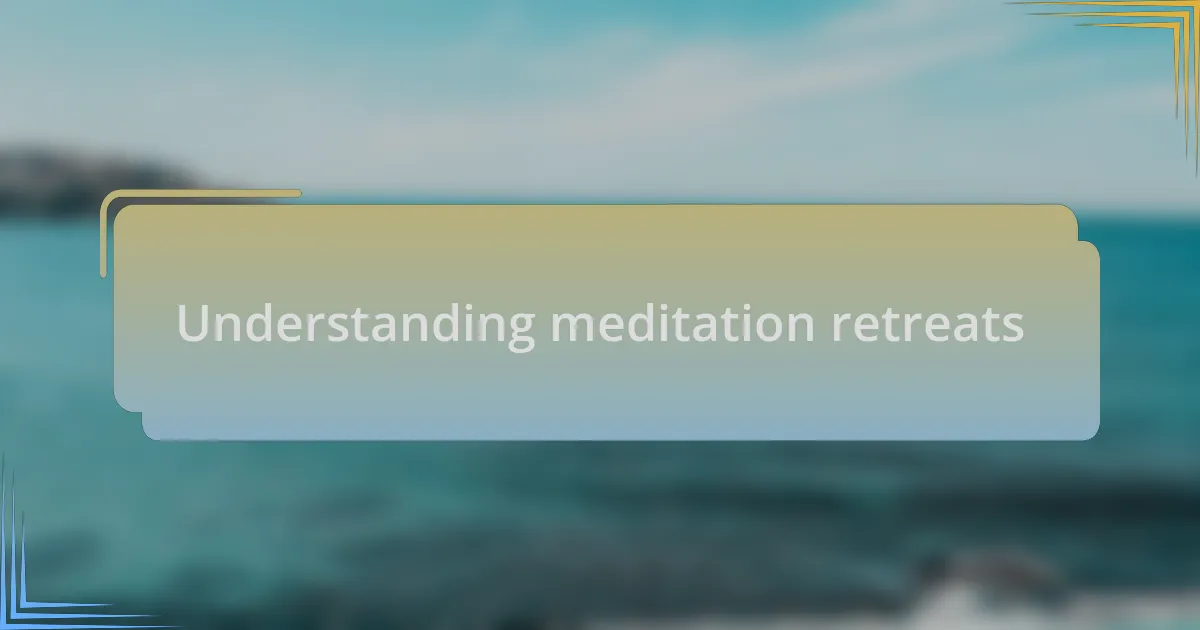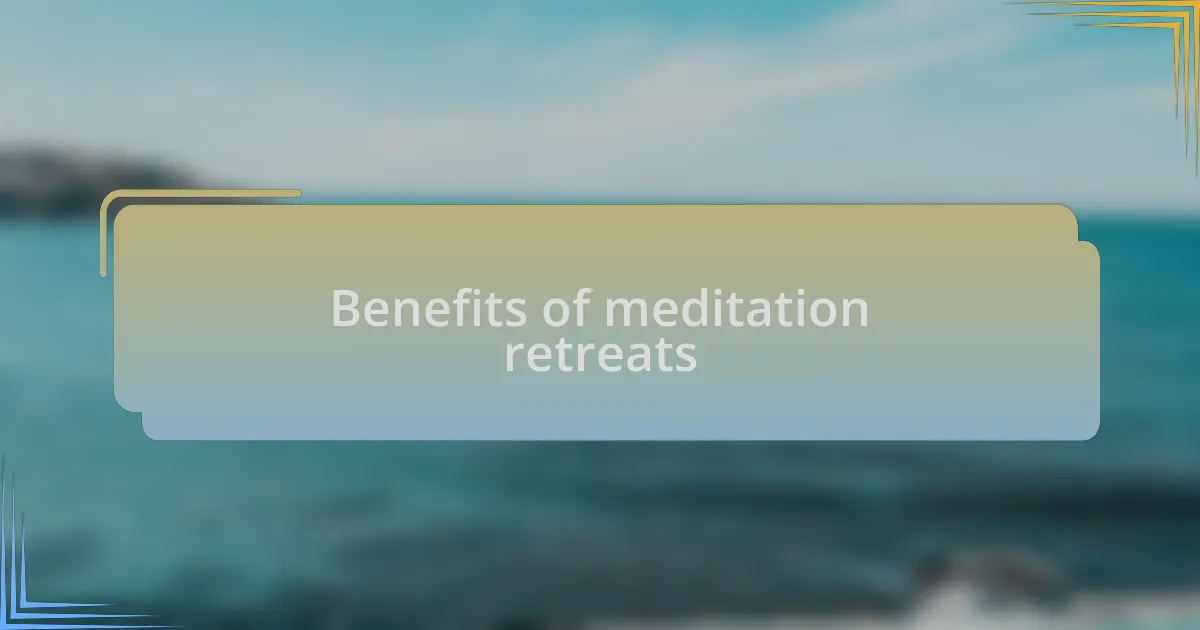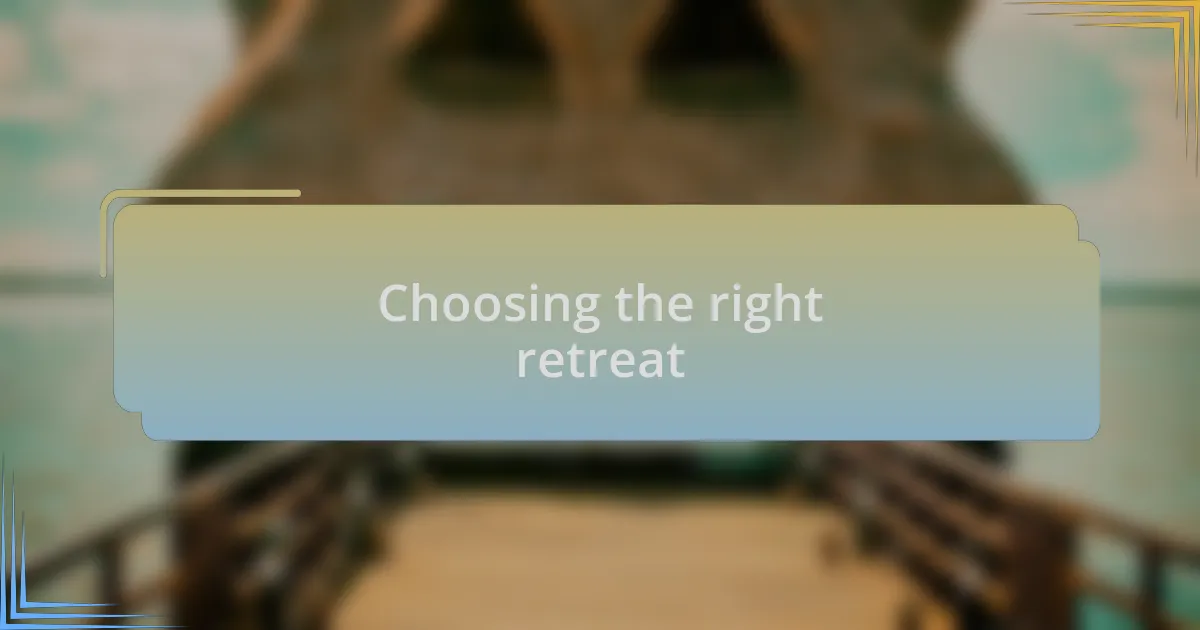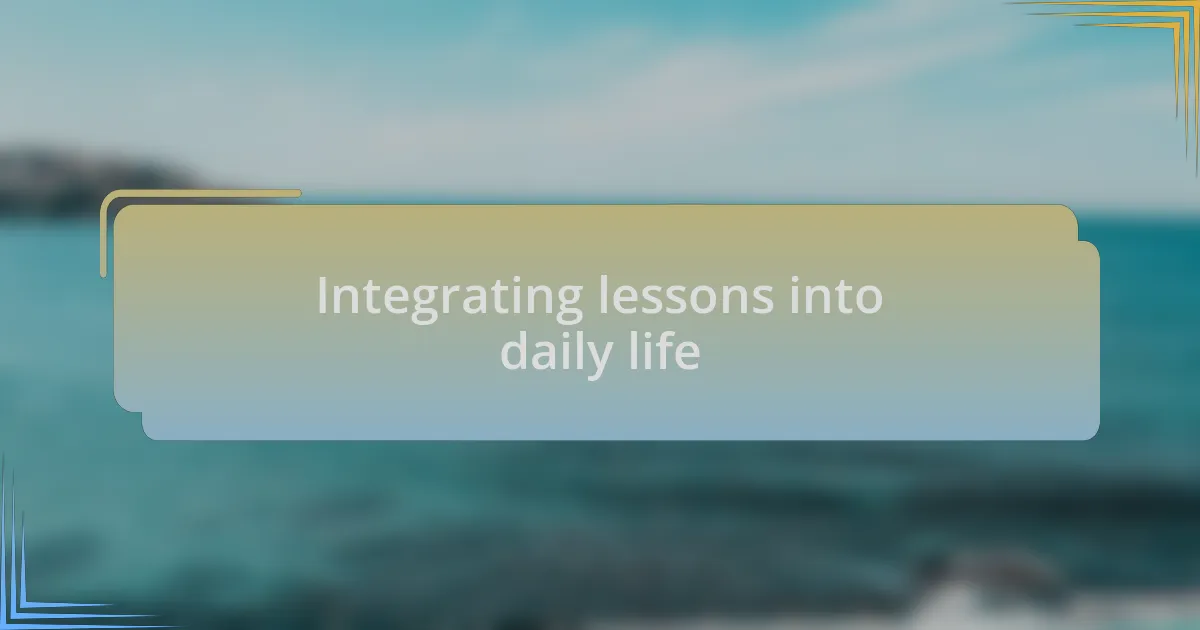Key takeaways:
- Meditation retreats foster deep personal insights and emotional breakthroughs through silence and reflection.
- Disconnecting from technology enhances connections and promotes mindfulness, leading to improved clarity and focus.
- Preparation for retreats involves introspection, minimal packing, and mental readiness to immerse in the experience.
- Integrating retreat lessons into daily life can be achieved through small practices, self-compassion, and embracing discomfort for growth.

Understanding meditation retreats
Meditation retreats are designed to create a nurturing environment for inner exploration and growth. I remember my first retreat, where the serene landscape was the perfect backdrop for quiet reflection. Surrounded by nature, I felt an overwhelming sense of connection, not just to the environment, but to myself.
As I settled into the rhythm of daily practices, I began to realize that these retreats are more than just a break from daily life; they are transformative experiences. Have you ever found yourself overwhelmed by the chaos of everyday routines? During my second retreat, as I sat in silence, I discovered a profound stillness within me that I hadn’t experienced before, which helped me appreciate the beauty in simplicity.
These experiences often lead to profound insights and emotional breakthroughs. I vividly recall moments of tears and laughter emerging simultaneously during group discussions, reminding me that vulnerability is a strength. Isn’t it fascinating how stepping away from the daily grind can lead to such deep, personal revelations?

Benefits of meditation retreats
Retreats offer a unique opportunity to disconnect from technology and the constant noise of modern life. I remember when I turned off my phone for an entire week; at first, it felt strange and unsettling. However, losing that digital connection opened up space for deeper connections—both with myself and others in the group. Have you ever noticed how refreshing it is to engage in meaningful conversations without distractions?
Another benefit I experienced was the enhanced clarity and focus that emerged from practicing mindfulness daily. During my last retreat, I went through a guided meditation that led me to realize how often I let external stressors dictate my mood. This newfound perspective has transformed how I approach challenges in my daily life. Isn’t it empowering to see everyday obstacles through a lens of calm and resilience?
Moreover, the structured schedule of meditation retreats encourages a routine that many of us long for but rarely find in our bustling lives. I recall feeling a sense of accomplishment as I committed to morning rituals, including mindful breathing and gentle yoga. This discipline not only invigorated my mind but also revitalized my body. How often do we get the chance to prioritize our well-being in such a holistic way?

Choosing the right retreat
When it comes to selecting a meditation retreat, I’ve learned that it’s essential to consider the style and philosophy of the center. One time, I chose a retreat focused on silent meditation, which initially felt intimidating. But that experience taught me how silence can be a powerful teacher. Have you ever found that sometimes, in the quiet, you can hear your most profound thoughts?
Another factor to think about is the location and environment. I once attended a retreat nestled in the mountains, surrounded by lush greenery. The serene landscape not only lifted my spirits but also amplified my sense of inner peace. Isn’t it amazing how nature can resonate with our striving for calmness and clarity?
Lastly, the retreat length and schedule can significantly impact your experience. I’ve tried both weekend getaways and week-long immersions. While the shorter retreats often give a quick boost, it’s in the longer retreats that I found real transformation. How about you? What kind of experience are you hoping for – a swift refresh or a deeper dive into your meditation practice?

Preparing for your retreat
Preparing for your retreat requires a bit of introspection and planning. Before I embarked on my first retreat, I took some time to reflect on my intentions. Did I want to relieve stress, explore deeper meditation techniques, or simply escape my daily routine? Knowing my goals made the experience more meaningful and focused.
Packing for a meditation retreat is more than just throwing a few items into a bag. The first time I went, I packed way too many clothes but forgot essentials like my journal. I quickly realized that a simple, minimalist approach to my packing helped me focus on my inner journey rather than worrying about my belongings. If you can, aim to bring only what truly enhances your practice.
Lastly, I recommend preparing yourself mentally for the unique rhythms of retreat life. I remember feeling anxious about leaving my phone behind during one retreat. However, disconnecting allowed me to fully immerse myself in the practice. Have you considered how stepping away from technology can provide a fresh perspective on your thoughts and feelings?

Personal lessons from my retreats
During my meditation retreats, I discovered the power of silence. I recall a particular day when we sat in complete stillness for hours. At first, my mind raced with thoughts and worries, but gradually, I found that embracing that silence allowed me to uncover layers of emotions I hadn’t acknowledged before. Have you ever paused long enough to hear your inner voice?
Another profound lesson came from the practice of boundless compassion. There was a moment when I participated in a loving-kindness meditation and felt an overwhelming wave of empathy wash over me. I realized that this practice was not just for myself but a way to connect with others. How often do we extend compassion to ourselves before reaching out to others?
One striking insight was the realization that discomfort can be a catalyst for growth. I remember facing the challenge of sitting through a difficult meditation where my body ached and my mind rebelled. Instead of retreating from that discomfort, I learned to sit with it. This taught me that embracing challenges can lead to unexpected breakthroughs. Have you ever faced discomfort only to discover strength you didn’t know you had?

Integrating lessons into daily life
Integrating the lessons from meditation retreats into daily life isn’t always easy, but small daily practices can make a big difference. For instance, I’ve started setting aside just five minutes each morning to sit in silence, allowing me to reconnect with that initial spark of awareness I found during my retreats. Have you ever noticed how a few moments of stillness can completely transform your perspective for the day?
Moreover, I’ve made a conscious effort to practice compassion, starting with myself. When I catch myself being overly critical, I pause and recall those loving-kindness meditations where I learned to bathe my thoughts in kindness. There’s every chance you’ll find that grace is a ripple effect—by being kinder to yourself, you naturally extend that kindness to others.
Finally, I often reflect on the discomfort I experienced during my retreats. Whenever I encounter a challenging situation—like a tough conversation at work or an unexpected hurdle—I remind myself of those moments on the meditation cushion. I’ve learned that my greatest growth comes from moments of discomfort. What if we all chose to view challenges as invitations to grow rather than obstacles to avoid?